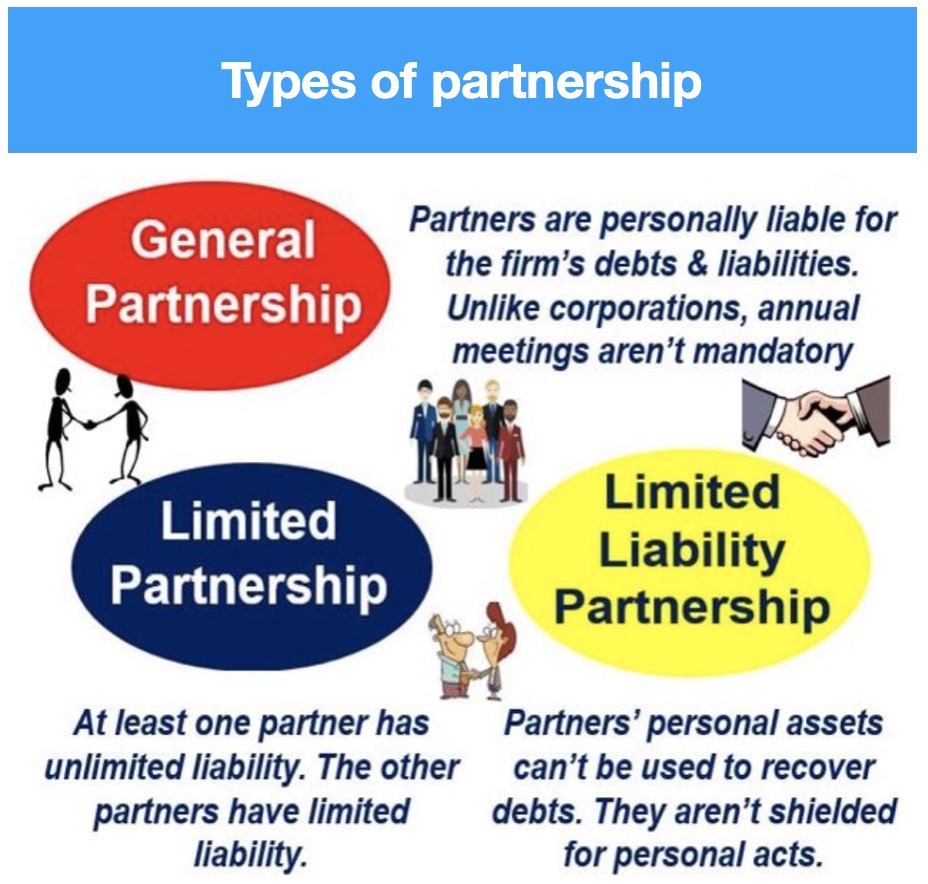A Partner can mean one thing in a law or accounting firm, and something different in a company, corporation, international arrangement between two nations, or a joint venture. A business partner is a person or commercial entity which has some kind of alliance with another person or commercial entity.
In a partnership, partners could be people who agree to cooperate in order to advance their common (mutual) interests. The partners in a partnership are not always humans, they could be businesses, schools, universities, interest-based organizations, governments or combinations.
Two organizations may partner together in order to improve the likelihood of achieving their mission and amplify their reach. A partnership could result in holding or issuing equity or might be only governed by a contract.
Liability
Full partners in a partnership, unlike shareholders in a limited liability company, are personally liable for the business’ losses and debts. This means that people and entities that are owed money – creditors – can go after their personal assets and savings, including their homes, to get their money back.
There are some types of limited partnerships or limited liability partnerships in which some of the partners are not personally liable for the firm’s losses.
In the US, ‘partner’ is sometimes used in a friendly form of address by one person to another as in: “How you doing, partner?”
The verb ‘to partner’ may mean to act as somebody’s partner in a dance, sport, game or activity, or to join another organization or individual in a business activity.

Compensation of partners
In law or accountancy firms, there are different types of partners, such as equity or contract (salaried) partners.
In a typical law firm, for example, an equity partner has an underlying ownership interest in the whole company and receives a proportion of the distributable profits of the partnership.
As the name implies, a salaried partner is paid a salary but does not receive a proportion of the distributions of the firm. He or she may receive a bonus based on the firm’s profitability.
A partnership – United States
In the US, there is no specific statutory law in the federal government regarding the establishment of a partnership. Each state, including the District of Columbia, has its own statutes.
Every US state mainly follows the general common law principles of partnership whether they be a general partnership, limited partnership or limited liability partnership.
A partnership – United Kingdom
In the UK, a limited partnership is either:
– One or more individuals known as general partners who are liable for all the firm’s debts and obligations, or
– One or the firm beyond the amount contributed.
A limited partner in the United Kingdom is not allowed to draw out or receive back parts of the initial investment made in the partnership during its lifetimes. Neither can he or she take part in the management of the firm.
According to Oxford Dictionaries, a partner is:
“A person who takes part in an undertaking with another or others, especially in a business or firm with shared risks and profits. Either of two people dancing together or playing a game or sport on the same side. Either member of a married couple or of an established unmarried couple.”
The word partners may refer to double-act entertainers (duos) such as Laurel and Hardy, Dean Martin and Jerry Lewis, The Two Ronnies, Bob Hope and Bing Crosby, Abbott and Costello, Gene Wilder and Richard Pryor, and Morecambe and Wise.
Etymology of partner
According to etymologists (they study the origin of words), the English word ‘partner’ first emerged in Britain in the thirteenth century as an altered form of parcener, which originated from Old French parçonier, which meant ‘associate, partner, joint owner’. Parçonier came from parçon, which means ‘partition, share, lot and portion’. Experts say that ‘partner’ may also represent tenour, the Old French word meaning ‘part holder’.
Partner in other languages
Partenaire (French), Socio (Spanish), Sócio (Portuguese), Socio (Italian), Partner (German), партнер (Russian), パートナー (Japanese), شريك (Arabic), 伙計 (Chinese Cantonese), 伙伴 (Chinese Mandarin), साझेदार (Hindi), Mitra (Indonesian), Mshirika (Swahili), অংশীদার (Bengali).
Non-business meaning
In a non-business context or situation, we use the term ‘partner’ instead of husband, wife, or a person we are romantically involved with (boyfriend/girlfriend) on a long-term basis.
If I say, “Hi, my name is Fred and this is my partner Susan,” it means that Susan is either my wife, somebody I live with, or my girlfriend.
Famous quotes using ‘partner’
Nelson Mandela (1918-2013, former President South Africa)
“If you want to make peace with your enemy, you have to work with your enemy. Then he becomes your partner.”
Kit Bond, former US Senator
“The U.S. is looking to India as more then just a marketplace for our defense products, but as a technology, aerospace and strategic partner for our future endeavors.”
Golda Meir (1898-1978, former Israeli Prime Minister)
“You’ll never find a better sparring partner than adversity.”
Angela Merkel (former German Chancellor)
“Overcoming the Cold War required courage from the people of Central and Eastern Europe and what was then the German Democratic Republic, but it also required the steadfastness of Western partner over many decades when many had long lost hope of integration of the two Germanys and Europe,” (Angela Merkel – Chancellor of Germany)
Bobby Flay (US Celebrity Chef)
“Even if the chef has a good business head, his focus should be behind kitchen doors. A business partner should take care of everything in front of the kitchen doors.”
Video – What is a Partner?
This video presentation, from our YouTube partner channel – Marketing Business Network, explains what ‘Partner’ means using simple and easy-to-understand language and examples.
